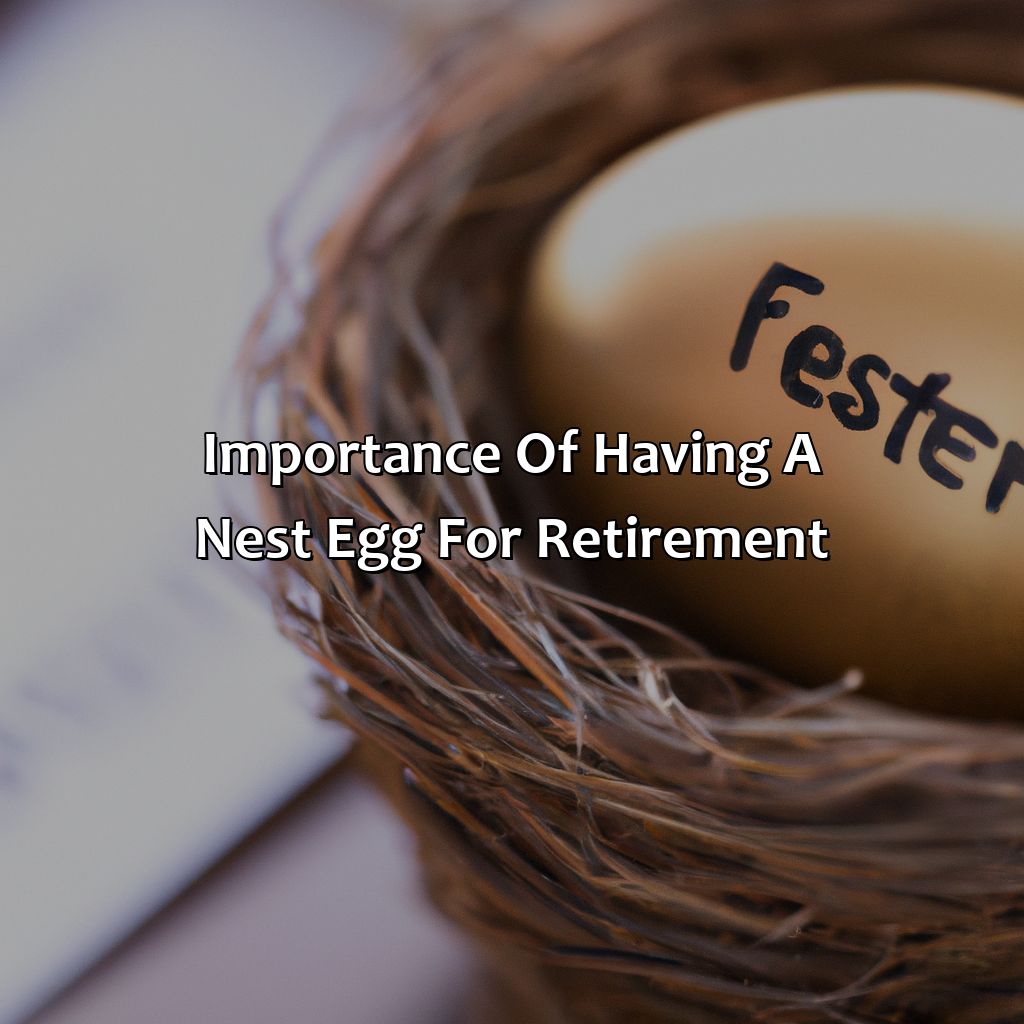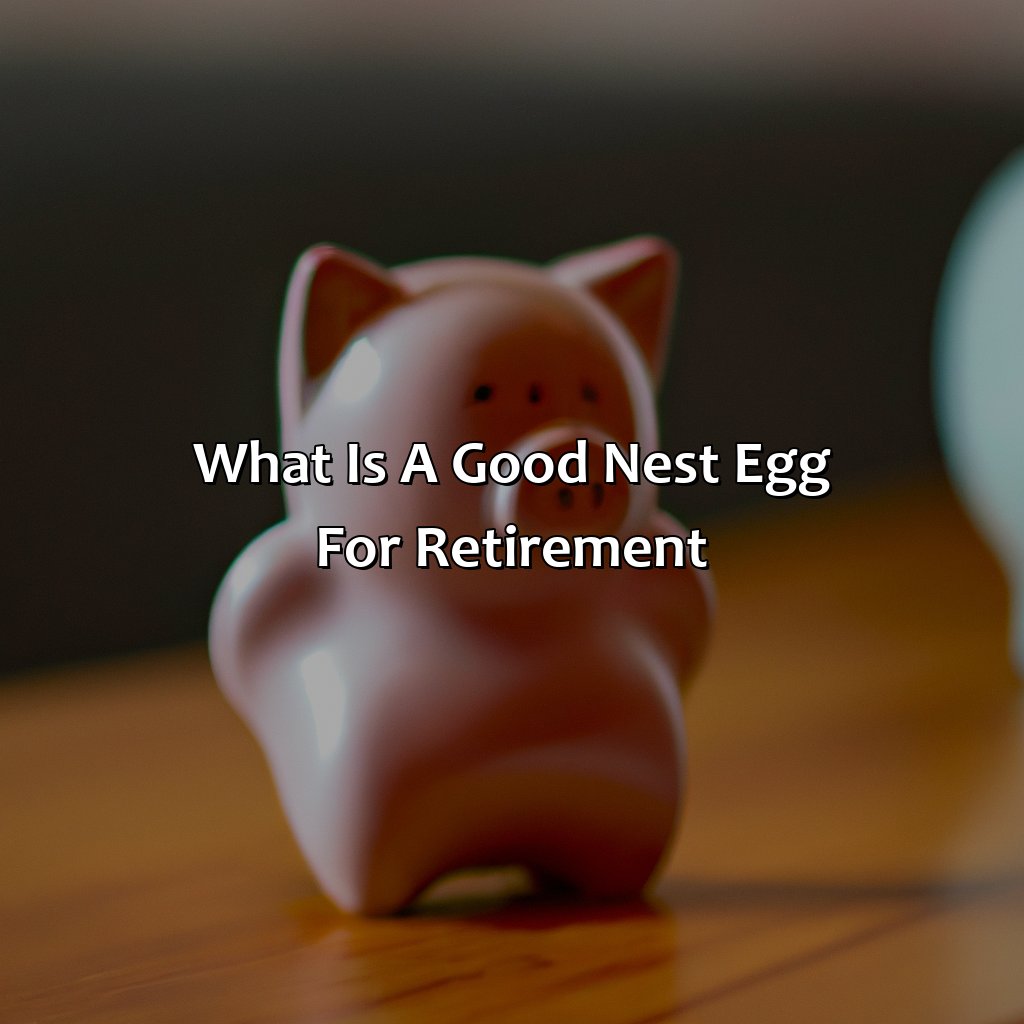What Is A Good Nest Egg For Retirement?
Key Takeaway:
- It is important to have a nest egg for retirement to ensure financial security in old age. Without a sufficient nest egg, retirees may struggle to cover basic expenses and healthcare costs.
- Determining a good nest egg requires considering various factors, such as retirement goals, expected lifespan, sources of income, and inflation. These factors will vary depending on individual circumstances and must be evaluated carefully.
- Recommendations for a good nest egg include saving at least 15% of income, starting early and investing wisely, diversifying investments and minimizing fees, planning for unexpected expenses, and reassessing and adjusting regularly. These steps can help retirees build and maintain a solid nest egg that can sustain them through retirement.
Are you worried about having enough money for a comfortable retirement? Having a nest egg is essential to secure your future and provide financial security. You can achieve financial freedom with the right nest egg. Discover the best retirement savings strategies here!
Importance of having a nest egg for retirement
Nest egg for retirement is crucial for a financially secure future. This amount of money is meant to support individuals after they retire from work and no longer have a steady source of income. Building a substantial nest egg takes time; however, investing small amounts at regular intervals can reap considerable benefits in the long run. A well-thought-out retirement savings plan can provide individuals with a comfortable standard of living in their golden years.
The significance of a nest egg for retirement lies in securing an individual’s financial future. Saving and investing correctly helps people live with financial independence and allows them to enjoy their post-retirement life to the fullest. It’s essential to start saving as soon as possible to accumulate enough funds for a secure future. One can opt for various investment plans, such as 401(k) plans, individual retirement accounts, or annuities, to accumulate a sizeable nest egg. These plans come with tax benefits and provide a buffer against inflation.
It’s necessary to keep in mind that retirement needs and expenses are dynamic and can change over time. So, it’s crucial to keep adjusting the savings plan to meet the changing requirements. Re-evaluating the savings plan every few years can ensure that the nest egg grows adequately.
Pro Tip: While planning for retirement, it’s essential not to compromise on the present. Investing too much and ignoring the current requirements can lead to stress and unease. So strike the right balance and start building your nest egg for a comfortable retirement.

Image credits: retiregenz.com by Yuval Washington
Factors to consider in determining a good nest egg
To guarantee a comfy retirement, there are many things to consider. Life expectancy, health care costs, social security and other income sources, inflation, and investment returns. This section will explore solutions for achieving a good nest egg, taking into account all necessary expenses and financial realities. Delve into each sub-section, to ensure a secure retirement with goals and lifestyle in mind.

Image credits: retiregenz.com by Yuval Washington
Retirement goals and lifestyle
Planning for your future financial stability should factor in the life you’d like to lead in retirement. To adequately prepare for retirement, consider your retirement goals and lifestyle choices. This will help determine how much savings you may need to support yourself after leaving the workforce.
Retirement planning is not one-size-fits-all and varies depending on individual goals and preferences. Consider if you would like to travel often and indulge in costly hobbies or enjoy a simpler, lower-cost lifestyle during your retirement years.
Other factors such as anticipated health care expenses, living arrangements, supporting dependents, and financial legacies can also impact your retirement needs. It’s crucial to think about these aspects of your future life when developing a financial plan.
Understanding how much money you may need during retirement can be overwhelming. However, putting off planning can mean missing out on the opportunity for compound interest earnings over time. Start planning early with a holistic view of your income sources, spending needs, investment opportunities, and long-term plans to increase security in your golden years.
Remember, the only thing more expensive than a good health care plan is a bad one.
Expected life span and health care expenses
When planning for retirement, it is essential to consider the expected life span and associated healthcare expenses. The longer one lives, the more healthcare costs they are likely to incur.
Below is a table detailing the approximate cost of health care expenses for retirees in their 60s, 70s, and 80s:
| Age | Annual Health Care Cost |
|---|---|
| 60s | $5,000 – $10,000 |
| 70s | $8,000 – $16,000 |
| 80s | $12,000 – $25,000 |
In addition to health care costs, factors such as lifestyle habits, family medical history, and geographic location can affect retirement planning.
It is important to note that according to a study by Fidelity Investments in 2021, the estimated amount needed for healthcare expenses during retirement is approximately $300k per person.
According to financial experts at Forbes magazine.org in January 2022.
With Social Security, at least you’ll have some income to cushion the blow when your adult children move back in with you.
Social Security and other sources of income
Retirees should consider government benefits and additional streams of income when determining their nest egg. Social Security, pensions, annuities and part-time work can supplement retirement funds. It’s essential to maximize Social Security benefits by delaying withdrawals until full retirement age. Additionally, working past retirement can boost Social Security payments.
When deciding on your nest egg needs for retirement, it is crucial to consider all available sources of ongoing income, including traditional and non-traditional options. For example, retirees may want to explore potential investment opportunities or monetize a hobby through freelance work or entrepreneurial ventures. Any form of consistent income will provide greater stability in the long-term.
A report from the Center on Budget and Policy Priorities (CBPP) states that one-third of elderly persons living in poverty would not be able to do so without the help of Social Security benefits. These figures are a stark reminder that Social Security plays an essential role in helping individuals maintain financial security during their golden years.
Through comprehensive planning and exploration of both anticipated and unforeseeable sources of income, retirees can secure their financial future and rest easy knowing they have built a solid nest egg for retirement.
Better invest in stocks, or your retirement fund will be as inflated as your ego.
Inflation and investment returns
The Relationship between Inflation and Investment Returns
One important factor to consider when determining a good nest egg for retirement is the impact of inflation on investment returns. Inflation can erode the value of savings over time, so it’s crucial to invest in assets that can keep up with or beat inflation.
To achieve this, investors can consider investing in stocks, real estate, commodities, or other alternative investments that have historically provided higher returns than bonds or cash. It’s also essential to regularly revisit and adjust investment portfolios to ensure they remain aligned with your long-term financial goals.
Furthermore, it’s worth noting that while past performance does not guarantee future results, historical data suggests that a diversified portfolio held over the long term has been an effective way to mitigate inflation risk and grow wealth over time.
According to a report by Vanguard, from 1926 through 2020, U.S. stocks have outperformed inflation by an average annual rate of 7% after adjusting for dividends and inflation. This highlights the potential benefits of a well-diversified investment strategy that can help build a sustainable nest egg for retirement.
Save like a miser, invest like a pro, and maybe your nest egg will hatch into a golden goose.
Recommendations for a good nest egg
For a comfy retirement and financial security, a great nest egg is key. This article has some great tips with:
- “Saving 15% of Income“
- “Starting Early and Investing Wisely“
- “Diversifying Investments and Minimizing Fees“
- “Planning for Unexpected Expenses“
- “Reassessing and Adjusting Regularly“
Together, they form a comprehensive guide to get you there.

Image credits: retiregenz.com by Harry Arnold
Saving 15% of income
One of the recommended strategies for ensuring a solid nest egg is to put aside 15% of your income. This can be achieved by starting early and contributing consistently throughout your working years. By regularly allocating a portion of income towards retirement savings, individuals may accumulate a substantial amount for their post-work years. Additionally, this method can provide peace of mind and financial security during retirement.
Moreover, it is important to note that this percentage may vary depending on personal circumstances such as age and expected retirement expenses. For instance, experts recommend increasing the percentage if you start saving later in life or have high anticipated expenses. Consulting with a financial advisor can help determine the appropriate savings rate.
A true fact is that according to a survey conducted by Bankrate, only 28% of Americans are saving more than 15% of their income for retirement.
Starting early and investing wisely: Because nothing says ‘I’m adulting responsibly’ like buying stocks instead of shoes.
Starting early and investing wisely
Investing early and wisely for retirement is crucial to build a robust nest egg. By starting on time, you can reap the benefits of compound interest and give your money more time to grow. With strategic investments in stocks, bonds, mutual funds, and other financial instruments, you can safeguard your future financially.
In order to ensure a stable financial future, it is important to diversify your portfolio. Consider investing in low-cost index funds or exchange-traded funds (ETFs) that track a broad range of sectors. Additionally, balance your high-risk investments with safer options such as fixed deposits or government-backed securities.
While investing heavily is important, it’s also crucial to have a clear understanding of your expenses during retirement. This includes considering factors like inflation rates, medical bills and routine expenses as well as other one-time expenditures specific to individual circumstances.
To make sure that you accumulate enough for retirement each year through saving and investment portfolios, you will need periodic rebalancing efforts throughout so that the funding doesn’t fail due to market fluctuations. Save at least 10-15% of your salary each month towards retirement fund building instead of waiting until late in life when concerns about employment prospects could arise.
Minimizing fees is like avoiding a sneaky ex, you don’t want them taking a cut of your hard-earned money.
Diversifying investments and minimizing fees
Investment Diversification and Fee Reduction Tips
Diverse investments and low fees should be considered when building a retirement nest egg. Here are three tips to achieve these goals:
- Invest in various assets: Investing in multiple assets can protect against losses that may occur due to market fluctuations. However, it’s important not to diversify excessively as it can cause higher expenses.
- Use Low-Cost Funds: Expenses must be kept under control too, by using index funds or exchange-traded funds (ETFs) with lower fees than mutual funds; that also contribute back to your savings.
- Minimize Portfolio Churn – Transactions for maximizing returns or reducing risk are necessary but it may attract a high commission and reduces the profit margin.
For better results: avoid overinvesting in one area of the market, review investment costs, find an advisor fee-only charges minimizing unexpected surprises.
Pro tip: The best way to manage fees is to understand how fees compound over time; even small changes can make a big impact, turning tiny amounts of savings into millions of dollars over many years.
When life gives you unexpected expenses, just remember that your nest egg is the yolk that holds it all together.
Planning for unexpected expenses
Building contingency plans for sudden expenditures is essential to ensure long-term financial stability. In retirement planning, unforeseen expenses such as medical emergencies or home repairs can derail retirement goals. Therefore, it’s crucial to create a financial cushion for addressing unexpected costs sans harming the savings plan.
To plan for a contingency fund, first categorize expenses into urgent and non-urgent and calculate those figures. Proactively create cutbacks like eating out less often or trimming luxury expenses and incorporate them into your budget. Make wise investments in safe and stable assets specific to retirement planning.
Moreover, updating your insurance policies regularly will help maintain protection against unforeseeable events that might cause financial stress. For example, disability insurance or long-term care insurance should be considered coverage options for retirees.
Recent research by the Employee Benefit Research Institute states that almost half of retirees with income between $50,000-$200,000 don’t have enough money aside for emergency purposes in the first two years of their retirements – (Investopedia).
Reassessing and adjusting regularly
Regularly revising and adapting one’s retirement savings plan is critical in achieving a successful nest egg. Flexibility in the plan can aid people in tracking progress, projecting future expenses, and making timely adjustments to reach their goals. This practice can assist individuals in developing a solid foundation for their golden years.
Periodically monitoring your investments, estimated expenses, and income sources empowers you to respond promptly to changes that may impact your retirement strategy mid-term. The ability to adapt with changing market trends and evolving healthcare costs or family obligations can help secure a more comfortable lifestyle during your retirement years. So, regular revision is essential.
Moreover, reallocating money from market sectors that are not performing well or those stocks that no longer align with your financial strategy is also crucial. This approach could be an excellent opportunity to capitalize on the latest trends while minimizing risks accordingly.
Last but not least, maximizing contributions when possible is highly recommended. Even though it might seem difficult at times, this move will allow individuals to benefit exponentially from compounded growth over time. It’s good to keep track of tax-deferred accounts that offer tax benefits like 401(k) plans or traditional IRAs; these can help reduce taxes owed while building wealth.
Some Facts About a Good Nest Egg for Retirement:
A good rule of thumb is to save at least 10-15% of your income for retirement. (Source: NerdWallet)
Experts recommend aiming for a retirement savings goal of 25 times your annual expenses. (Source: Fidelity)
Social Security benefits may only cover a portion of your retirement expenses, so it’s important to have additional savings. (Source: The Motley Fool)
Compound interest can significantly grow your retirement savings over time. (Source: CNBC)
Diversifying your retirement portfolio can help mitigate risk and maximize returns. (Source: Forbes)
FAQs about What Is A Good Nest Egg For Retirement?
What is a good nest egg for retirement?
A good nest egg for retirement is an amount of savings that will provide financial security and cover your expenses throughout your retirement years. The amount of savings required varies based on a number of factors, including your lifestyle, expected expenses, and expected length of retirement.
How much should I save for retirement?
Financial experts recommend saving at least 15% of your income each year for retirement. However, the actual amount you should save depends on a number of factors, including your desired retirement lifestyle, how much you’ve already saved, and your expected expenses during retirement.
What is the 4% rule?
The 4% rule is a general guideline that suggests withdrawing only 4% of your retirement savings each year during retirement. This is based on the idea that your savings will continue to grow over time, even with some withdrawals, so that you do not deplete your savings too quickly. However, it’s important to adjust your withdrawal rate based on changes in your expenses and overall savings.
When should I start saving for retirement?
It’s never too early to start saving for retirement. Ideally, you should start saving as soon as you start earning income. The earlier you start, the more time your savings will have to grow and compound, providing you with a larger nest egg in retirement.
What if I haven’t saved enough for retirement?
If you haven’t saved enough for retirement, it’s important to take action as soon as possible. You may need to increase your savings rate, work longer, or adjust your retirement lifestyle to reduce expenses. Consulting with a financial advisor can also be helpful in developing a plan to maximize your savings and prepare for retirement.
How can I make the most of my retirement savings?
There are several strategies for making the most of your retirement savings, including investing in a mix of stocks and bonds, diversifying your investments, and minimizing fees and taxes. It’s also important to regularly review and adjust your investments and overall financial plan as needed to ensure you’re on track to meet your retirement goals.
 Checkout this IRS Loophole
Checkout this IRS Loophole 




